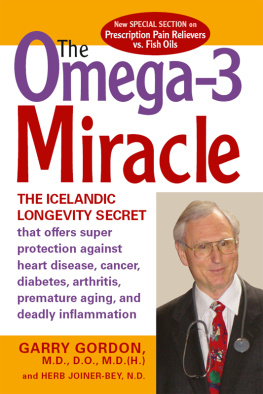Watson Ronald Ross - Omega-3 Fatty Acids in Brain and Neurological Health
Here you can read online Watson Ronald Ross - Omega-3 Fatty Acids in Brain and Neurological Health full text of the book (entire story) in english for free. Download pdf and epub, get meaning, cover and reviews about this ebook. year: 2014, publisher: Elsevier Science, genre: Romance novel. Description of the work, (preface) as well as reviews are available. Best literature library LitArk.com created for fans of good reading and offers a wide selection of genres:
Romance novel
Science fiction
Adventure
Detective
Science
History
Home and family
Prose
Art
Politics
Computer
Non-fiction
Religion
Business
Children
Humor
Choose a favorite category and find really read worthwhile books. Enjoy immersion in the world of imagination, feel the emotions of the characters or learn something new for yourself, make an fascinating discovery.

- Book:Omega-3 Fatty Acids in Brain and Neurological Health
- Author:
- Publisher:Elsevier Science
- Genre:
- Year:2014
- Rating:5 / 5
- Favourites:Add to favourites
- Your mark:
- 100
- 1
- 2
- 3
- 4
- 5
Omega-3 Fatty Acids in Brain and Neurological Health: summary, description and annotation
We offer to read an annotation, description, summary or preface (depends on what the author of the book "Omega-3 Fatty Acids in Brain and Neurological Health" wrote himself). If you haven't found the necessary information about the book — write in the comments, we will try to find it.
Omega-3 Fatty Acids in Brain and Neurological Health — read online for free the complete book (whole text) full work
Below is the text of the book, divided by pages. System saving the place of the last page read, allows you to conveniently read the book "Omega-3 Fatty Acids in Brain and Neurological Health" online for free, without having to search again every time where you left off. Put a bookmark, and you can go to the page where you finished reading at any time.
Font size:
Interval:
Bookmark:

- Tables in Chapter 3
- Tables in Chapter 4
- Tables in Chapter 6
- Tables in Chapter 7
- Tables in Chapter 8
- Tables in Chapter 9
- Tables in Chapter 10
- Tables in Chapter 14
- Tables in Chapter 16
- Tables in Chapter 22
- Tables in Chapter 23
- Tables in Chapter 24
- Tables in Chapter 25
- Tables in Chapter 27
- Tables in Chapter 28
- Tables in Chapter 29
- Tables in Chapter 33
- Tables in Chapter 34
- Tables in Chapter 36
- Tables in Chapter 37
- Figures in Chapter 3
- Figures in Chapter 4
- Figures in Chapter 5
- Figures in Chapter 7
- Figures in Chapter 9
- Figures in Chapter 10
- Figures in Chapter 12
- Figures in Chapter 14
- Figures in Chapter 16
- Figures in Chapter 18
- Figures in Chapter 20
- Figures in Chapter 21
- Figures in Chapter 22
- Figures in Chapter 24
- Figures in Chapter 26
- Figures in Chapter 27
- Figures in Chapter 29
- Figures in Chapter 31
- Figures in Chapter 34
- Figures in Chapter 37
Edited by
Ronald Ross Watson
University of Arizona, Arizona Health Sciences Center, Tucson, AZ, USA
Fabien De Meester
DMF Ltd Co., Belgium

Academic Press is an imprint of Elsevier
32 Jamestown Road, London NW1 7BY, UK
225 Wyman Street, Waltham, MA 02451, USA
525 B Street, Suite 1800, San Diego, CA 92101-4495, USA
Copyright 2014 Elsevier Inc. All rights reserved.
No part of this publication may be reproduced, stored in a retrieval system or transmitted in any form or by any means electronic, mechanical, photocopying, recording or otherwise without the prior written permission of the publisher.
Permissions may be sought directly from Elseviers Science & Technology Rights Department in Oxford, UK: phone (+44) (0) 1865 843830; fax (+44) (0) 1865 853333; email: for further information.
Notice
No responsibility is assumed by the publisher for any injury and/or damage to persons or property as a matter of products liability, negligence or otherwise, or from any use or operation of any methods, products, instructions or ideas contained in the material herein. Because of rapid advances in the medical sciences, in particular, independent verification of diagnoses and drug dosages should be made.
British Library Cataloguing-in-Publication Data
A catalogue record for this book is available from the British Library
Library of Congress Cataloging-in-Publication Data
A catalog record for this book is available from the Library of Congress
ISBN: 978-0-12-410527-0
For information on all Academic Press publications visit our website at elsevierdirect.com
Typeset by MPS Limited, Chennai, India www.adi-mps.com
Printed and bound in United States of America
Transferred to Digital Printing in 2014

Ronald Ross Watson
Brain disorders resulting from omega-3 fatty acid deficiencies or inadequacies are one of the major preventative health opportunities, as treatment by dietary food and supplementation show great benefits, are safe, and relatively economic. As reviewed by Singh and Watson, the dietary long-chain omega-3 fatty acids eicosapentaenoic acid (EPA) and docosahexaenoic acid (DHA) are showing benefits in longevity as well as in molecular gerontology applications, as defined by Rattan. Their mechanisms of action in neurological tissues include unregulated lipid peroxidation, as described by Yoshida and Shichiri, with peroxisomal pathways in neurodegenerative disorders and therapeutic strategies, as summarized by Rise, Paroni, and Petroni. Not surprisingly, mental health issues are significantly affected due to low intakes of omega-3 fatty acids in much of the world on a similar magnitude to that of the expanding obesity epidemic. Kanoski describes the role of traditional Western diets, with their promotion of obesity, on cognitive impairment. For example, the Japanese, through a high consumption of fish, have an adequate intake of 1000 mg/day, while typical European diets provide only 100125 mg/day. This yields inadequacy or deficiency within the brain and neurological effects, so that adequate levels of omega-3 fatty acids impact the quality of life, according to van de Rest. Farooqui defines the fatty acids lipid mediators which reduce neurological oxidative stress as key mechanisms of action. Gazzaruso and coworkers note the importance of genetic risk factors as targets in the major chronic disease diabetic neuropathy.
It is critical that more scientists research and evaluate the effects of long-chain omega-3 fatty acids in brain health and neurological function. This will increase understanding at government, scientific, and importantly, general population levels. While it is increasingly accepted that omega-3 fatty acids in high levels benefit a variety of human diseases, their effects on neurological diseases is still emerging. Waluk and coauthors describe the actions of mammalian fatty amides in the brain and central nervous system to help understand their roles in health and disease. Similarly, Serfaty and coworkers describe the extensive data showing that low omega-3 fatty acids adversely affect development of visual connections. With industrialization, societies have changed their traditional dietary consumption of fats, frequently with adverse consequences to health and mental function. A sedentary lifestyle with increased availability of high energy foods has occurred. There has been a dramatic increase in the use of corn oil with its omega-6 polyunsaturated fatty acids, trans fatty acids, with more animal products modified by diets high in fats. Simultaneously, the use of omega-3 fatty acids, primarily from fish, has been reduced. In the past several decades there has been approximately a 10-fold increase in the ratio of omega-6 compared to omega-3 consumption. As expected, Tokuyama found that omega-3 fatty acids modulated other aspects of neurological dysfunction, especially pain. In addition, Judge and coworkers found significant confirmatory research on the role of fatty acids in maternal and child mental health. At the other end of the age spectrum, Alfos defines the role of fish oil containing omega-3 fatty acids in preventing age-related memory loss via hormone receptors, while Tan reviews blood levels of fatty acids in aging brain function to understand their mechanisms of action. Paul also found limited evidence that omega-3 fatty acids acted on Alzheimers disease. Clearly the companion omega-6 fatty acids have adverse effects in high or disproportionate levels. Unfortunately, omega-6 fatty acids are the primary fatty acids consumed in most Western diets. Freeman described the association between the accumulation of other fats and fatty acids and obesity and changed cerebrovascular functions. The actions of such fatty acids in clinical depression are outlined by Chandola and coworkers, and their effects on major depression are outlined by Lawson. In children, their potential functions incorporated in fish oil in the growing epidemic of attention deficit hyperactivity disorder (ADHD) are summarized and reviewed by Ali.
Font size:
Interval:
Bookmark:
Similar books «Omega-3 Fatty Acids in Brain and Neurological Health»
Look at similar books to Omega-3 Fatty Acids in Brain and Neurological Health. We have selected literature similar in name and meaning in the hope of providing readers with more options to find new, interesting, not yet read works.
Discussion, reviews of the book Omega-3 Fatty Acids in Brain and Neurological Health and just readers' own opinions. Leave your comments, write what you think about the work, its meaning or the main characters. Specify what exactly you liked and what you didn't like, and why you think so.






